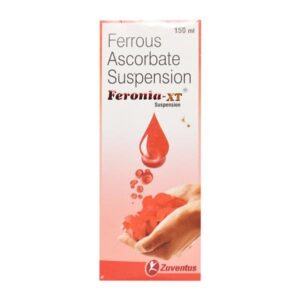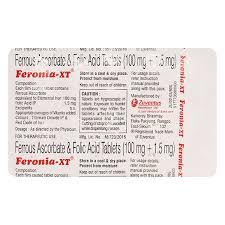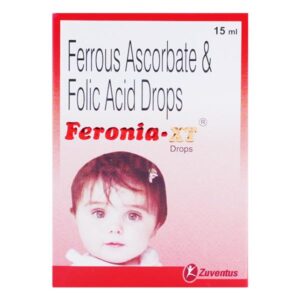FERROUS CALCIUM CIT + FOLIC ACID
Ferrous Calcium Cit: Ferrous Calcium Cit is a medication that combines two essential minerals, iron and calcium, in the form of citrate salts. It is primarily used as a dietary supplement to treat or prevent iron and calcium deficiencies in the body.
Iron is an essential mineral that is required for the formation of hemoglobin, a protein responsible for carrying oxygen throughout the body. Calcium, on the other hand, is crucial for the development and maintenance of strong bones and teeth.
The mechanism of action of Ferrous Calcium Cit involves the absorption of iron and calcium from the gastrointestinal tract into the bloodstream. Once absorbed, iron is transported to the bone marrow where it is incorporated into hemoglobin, increasing the oxygen-carrying capacity of red blood cells. Calcium is utilized by the body to maintain bone density and to support various physiological processes.
The recommended dose of Ferrous Calcium Cit may vary depending on the individual’s age, sex, and specific needs. It is generally taken orally with or without food. It is important to follow the instructions provided by the healthcare professional or as stated on the product label.
Like any medication, Ferrous Calcium Cit may cause side effects. Common side effects of iron supplementation may include constipation, diarrhea, nausea, stomach upset, dark-colored stools, and stomach cramps. Some individuals may also experience allergic reactions such as itching, rash, and difficulty breathing. Excessive intake of calcium may lead to symptoms such as stomach pain, kidney stones, and hypercalcemia (elevated levels of calcium in the blood).
It is important to consult with a healthcare professional before starting any medication, including Ferrous Calcium Cit, to determine the appropriate dosage, duration, and to discuss potential drug interactions or contraindications.
Folic Acid: Folic Acid, also known as Vitamin B9, is a water-soluble vitamin that is necessary for the proper functioning of the body. It is mainly used to treat or prevent folate deficiency, which can occur due to certain medical conditions, poor diet, alcoholism, or during pregnancy.
Folic Acid plays a crucial role in the synthesis and repair of DNA and RNA, as well as in the production of red blood cells and certain neurotransmitters. It is particularly important during pregnancy, as it helps to support the growth and development of the baby’s neural tube.
The recommended dose of Folic Acid varies depending on the individual’s age, gender, and health condition. For adults, the typical daily dosage for the treatment of deficiency is 400-800 micrograms (mcg). Pregnant women or those trying to conceive may require higher dosages, usually up to 600-800 mcg.
Folic Acid is generally safe for most individuals. However, some individuals may experience side effects such as nausea, stomach cramps, diarrhea, or allergic reactions. In rare cases, high doses of Folic Acid can mask the symptoms of vitamin B12 deficiency or lead to the accumulation of unmetabolized folic acid in the blood.
It is important to note that Folic Acid supplementation should not be used as a substitute for a balanced diet or to treat certain medical conditions without consulting a healthcare professional. Additionally, certain medications such as methotrexate or antiepileptic drugs can interfere with the absorption or metabolism of Folic Acid, so it is essential to inform your healthcare provider about all the medications you are taking before starting Folic Acid supplementation.



